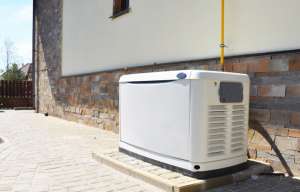What You Need To Know About Backup Generators
 he recent heavy rains left many residents in New Orleans and the surrounding areas without power. The heavy rains on July 10th came rather unexpectedly and hit some areas in the city much harder than predicted. If you don’t have a backup generator, now is a good time to get one. Keep in mind that we are in the middle of Hurricane season.
he recent heavy rains left many residents in New Orleans and the surrounding areas without power. The heavy rains on July 10th came rather unexpectedly and hit some areas in the city much harder than predicted. If you don’t have a backup generator, now is a good time to get one. Keep in mind that we are in the middle of Hurricane season.
Maintenance & Operation
Portable generators made for household use can provide temporary power to a small number of selected appliances or lights, while commercial generators can help prevent the interruption of operations at businesses and critical infrastructure facilities like hospitals, water treatment facilities, telecommunications networks, and emergency response agencies. However, federal, state, and local regulations may require you to obtain a permit before using a generator.
The Department Of Energy wants you to follow these regulations when you operate and maintain your generator:
- Incorrect generator use can lead to carbon monoxide (CO) poisoning from the engine exhaust, electric shock or electrocution, and fire. Even if you can’t smell exhaust fumes, you may still be exposed to CO. If you start to feel sick, dizzy, or weak while using a generator, get fresh air right away. If you experience serious symptoms, get medical attention immediately. Consider installing battery-operated CO alarms. Be sure to read the manufacturer’s instructions and take proper precautions. Use a portable generator only when necessary, and only to power essential equipment.
- Position generators outdoors and well away from any structure—Running a generator inside any enclosed or partially enclosed structure will lead to dangerous and often fatal levels of CO. Keep generators positioned outside at least 15 feet away from open windows so exhaust does not enter your home/business or a neighboring home/business.
- Keep the generator dry—Operate it on a dry surface under an open, canopy-like structure, and make sure your hands are dry before touching the generator. Do not use the generator in rainy or wet conditions.
- Disconnect the power coming into your home/business—Before you operate your generator, disconnect your normal source of power. Otherwise, power from your generator could be sent back onto the utility company lines, creating a hazardous situation for utility workers.
- Make sure your generator is properly grounded.
- Plug equipment directly into the generator—Use heavy-duty, outdoor-rated extension cords, in good working condition, with a wire gauge that can handle the electric load of any appliances connected to them.
- NEVER try to power the house/business wiring by plugging the generator into a wall outlet, or into the main electrical panel. Only a licensed electrician should connect a generator to a main electrical panel by installing appropriate equipment in accordance with local electrical codes. Make sure the electrician has installed an approved automatic transfer switch to disconnect your home’s wiring from the utility system before you start using the generator.
- Maintain an adequate supply of fuel—Know your generator’s rate of fuel consumption at various power output levels. Take care in considering how much fuel you can safely store, and for how long. Gasoline and diesel fuel stored for long periods may need added chemicals to keep them safe for use. Check with your supplier for recommendations. Store all fuels in specifically designed containers in a cool, dry, well-ventilated place, away from all potential heat sources. Check above ground storage tanks, pipes, and valves regularly for cracks and leaks, and replace damaged materials immediately. Tanks may also require a permit or have to meet other regulatory requirements.
- Turn the generator off and let it cool before refueling. Use the type of fuel recommended in the manufacturer’s instructions.
- Inspect and maintain your generator regularly—Arrange a maintenance contract and schedule at least one maintenance service per year, such as at the beginning of every hurricane season. Keep fresh fuel in the tank, and run the generator for a while periodically to help ensure it will be ready when you need it.
For more information visit: https://www.energy.gov/ceser/emergency-preparedness/community-guidelines-energy-emergencies/using-backup-generators






